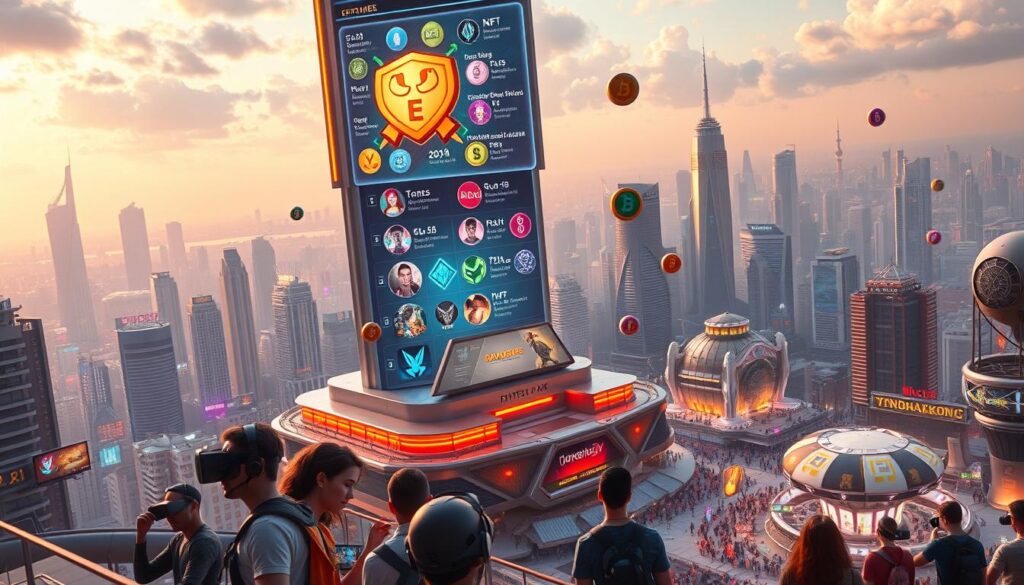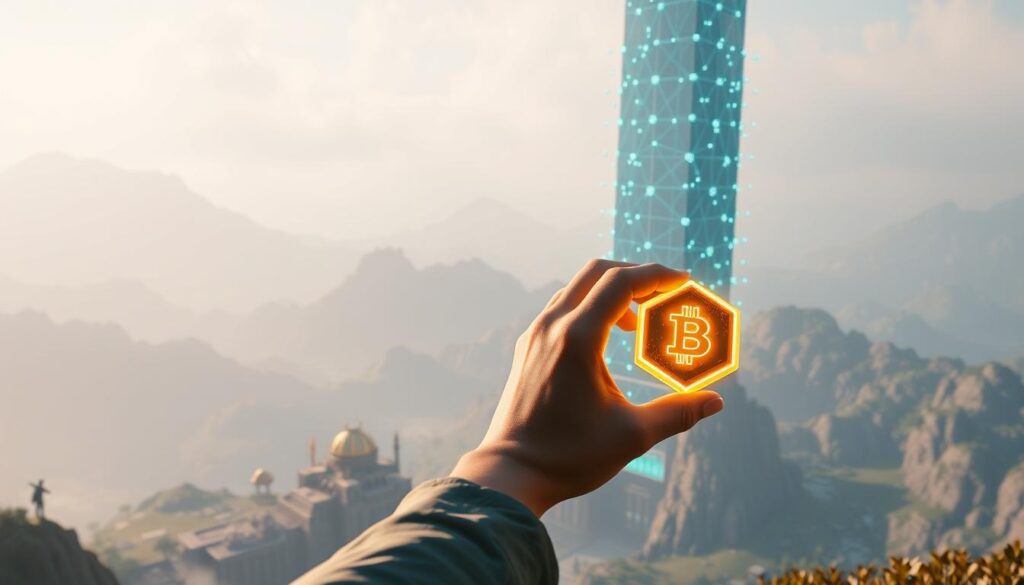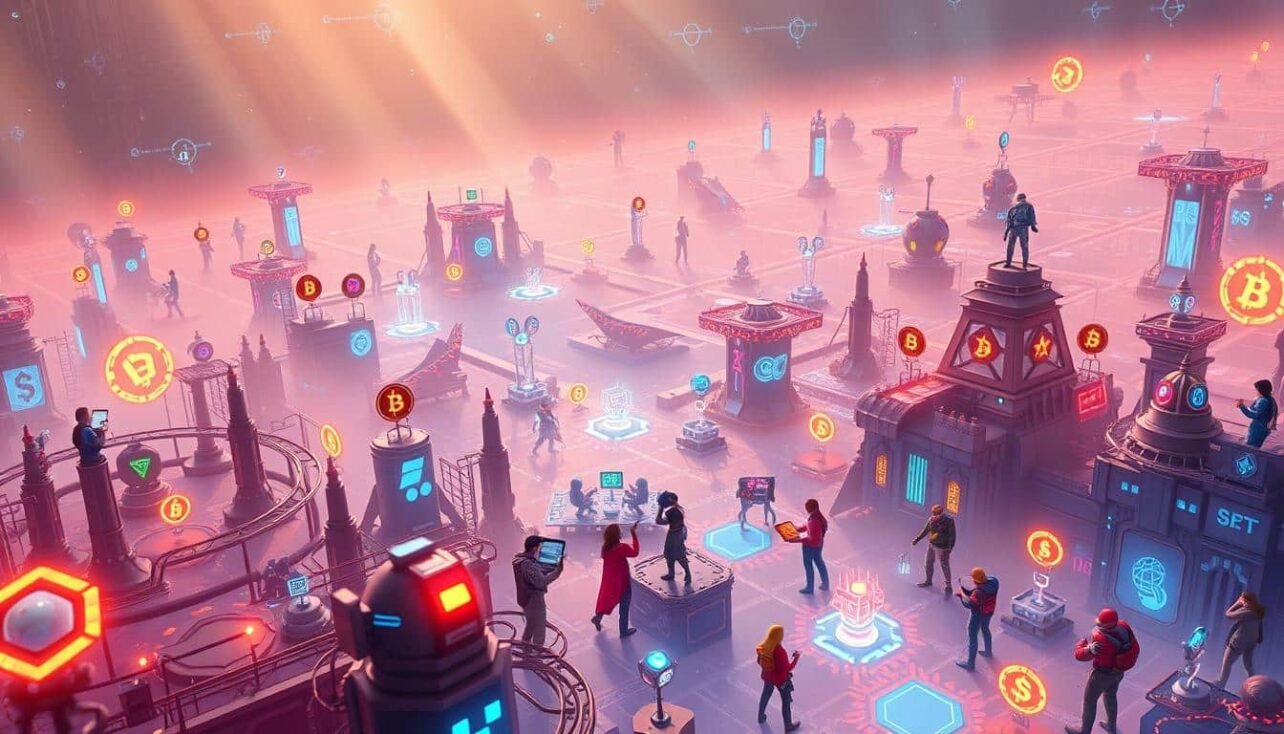The digital world continues evolving at breakneck speed, with blockchain technology leading one of the most significant shifts. What began as a financial innovation now powers entirely new ways to interact with virtual environments. This transformation is particularly visible in interactive entertainment, where users gain true control over their digital experiences.
Traditional models often left participants without lasting value for their time or investments. Today, decentralized systems enable players to own, trade, and profit from in-game items across multiple platforms. These unique digital collectibles exist on public ledgers, creating transparent markets that reward skill and participation.
Emerging economic frameworks allow enthusiasts to monetize their engagement like never before. The shift from centralized control to user empowerment mirrors broader changes in how we view digital property rights. Major platforms now showcase how virtual achievements can translate into real-world value through secure, interoperable systems.
Key Takeaways
- Blockchain integration creates verifiable ownership of virtual items
- New economic models reward players for their participation
- Digital assets gain cross-platform functionality and liquidity
- Energy-efficient innovations address environmental concerns
- Regulatory landscapes continue evolving with the technology
Introduction to NFT Gaming Tokens: A New Era in Digital Entertainment
A revolution in virtual environments is redefining how users interact with digital content. Where once centralized systems dictated terms, decentralized networks now empower participants through verifiable ownership models. This shift creates tangible value for time spent in virtual worlds.
Evolution from Traditional Games
Classic video games operated like rented apartments—players inhabited spaces controlled by developers. Purchased items could vanish if servers shut down or rules changed. Blockchain-based alternatives store in-game assets as cryptographic proofs, granting permanent rights even if titles get discontinued.
Early adopters discovered something groundbreaking: virtual swords or skins could hold resale value. Unlike traditional games, these items exist beyond corporate databases. Players trade them peer-to-peer using decentralized marketplaces, bypassing middlemen entirely.
Rise of Digital Ownership and In-Game Assets
True ownership transforms how communities engage with entertainment. A rare character skin becomes more than cosmetic—it’s a tradeable asset with provable scarcity. Blockchain ledgers track each item’s origin, ensuring authenticity across platforms.
This system rewards skillful participation. Top performers earn rare in-game assets that appreciate through community demand. Unlike closed ecosystems, these digital collectibles flow freely between compatible worlds, creating interconnected economies.
Blockchain Gaming: Revolutionizing the Industry
Modern interactive entertainment is undergoing a seismic shift through decentralized architectures. Unlike conventional platforms controlled by single entities, blockchain-based systems establish trust through verifiable mechanics. This transformation creates ecosystems where every action leaves an indelible mark on public records.

Transparency and Security in Gaming Transactions
Decentralized titles operate on distributed ledgers that track asset exchanges with military-grade precision. Each sword swing, currency trade, or virtual land purchase gets etched into immutable chains. Players verify transactions through shared records rather than trusting corporate databases.
Smart contracts handle tasks automatically—from loot distribution to tournament payouts. These self-executing agreements eliminate human error and manipulation. For example, rare item drops trigger instant ownership updates across all connected platforms.
- Fraud prevention through cryptographic verification
- Real-time audit trails for all in-game economies
- Cross-platform compatibility for digital collectibles
Security measures in blockchain-powered titles address longstanding industry issues. Duplicate items become mathematically impossible, while hacking attempts face decentralized firewalls. Thriving gaming communities now monitor ecosystems collectively, creating self-policing networks.
The technology’s applications range from simple ownership certificates to entire nations governed by player consensus. As adoption grows, these systems demonstrate how decentralized frameworks can reshape entertainment economics while maintaining rigorous security standards.
NFT gaming tokens and play to earn cryptocurrency opportunities explained
Virtual economies now extend beyond screen time into tangible value creation. Digital collectibles transform cosmetic upgrades into tradeable commodities through blockchain verification. These non-fungible tokens act as certificates of authenticity for everything from character outfits to virtual real estate.

Traditional titles lock items within closed ecosystems. Blockchain alternatives let users transfer in-game assets across platforms. A rare sword earned in one universe might fund adventures in another through decentralized marketplaces.
Earn games reward participation through crypto incentives. Completing quests or winning battles generates tradable tokens with real-world value. Top performers acquire limited-edition items that appreciate based on community demand.
This model creates diverse use cases beyond entertainment. Players monetize strategic skills through asset breeding systems or tournament winnings. Virtual land ownership enables entrepreneurial ventures like digital storefronts or event hosting.
Economic participation reshapes user engagement. Time invested yields measurable returns rather than temporary achievements. As decentralized systems mature, they bridge virtual accomplishments with financial empowerment through transparent, player-driven markets.
How Blockchain Technology Drives In-Game Ownership
The foundation of modern digital ownership lies in blockchain’s decentralized architecture. Unlike traditional systems where corporations control virtual items, distributed ledgers grant players indisputable rights. Every sword, skin, or virtual plot becomes a unique asset tied to cryptographic proof.

Automating Trust Through Smart Contracts
Self-executing agreements form the backbone of asset management. When players trade rare items or earn rewards, code-based rules handle transfers instantly. These smart contracts eliminate third-party oversight while ensuring compliance with preset conditions.
For example, tournament prizes distribute automatically to winners’ wallets. Ownership updates reflect across platforms in real time. This automation reduces fraud risks and creates frictionless economies.
Power of Decentralized Records
Public ledgers provide permanent transaction histories visible to all participants. When acquiring virtual land or customizing characters, each action leaves an immutable trail. The Ethereum blockchain and similar networks verify scarcity through mathematical certainty.
| Aspect | Traditional Systems | Blockchain Solutions |
|---|---|---|
| Ownership Proof | Developer Database Entry | Cryptographic Signature |
| Transaction Verification | Corporate Approval | Network Consensus |
| Asset Control | Platform-Dependent | Player-Controlled Wallets |
| Security | Central Server Protection | Decentralized Encryption |
This framework enables cross-title compatibility. A helmet earned in one universe could become part of another game’s lore. Players build portable inventories that retain value beyond individual platforms.
Through cryptographic validation and shared record-keeping, blockchain reshapes who controls digital experiences. Participants become true stakeholders rather than temporary users.
Pros and Cons of Blockchain Gaming
The gaming landscape faces a critical juncture as decentralized systems reshape player experiences. While blockchain integration brings groundbreaking benefits, it also introduces complex challenges that demand careful consideration.
Advantages: Security and True Ownership
Blockchain games revolutionize digital ownership through cryptographic verification. Players control rare items via private wallets, eliminating reliance on corporate servers. Advanced encryption protects transactions, with features like two-factor authentication becoming standard safeguards.
Interoperability lets users transfer achievements between titles. A character skin earned in one universe might unlock special abilities elsewhere. Decentralized governance models enable communities to shape game evolution through transparent voting systems.
Challenges: Entry Barriers and Technological Maturity
Newcomers face steep learning curves with crypto wallets and token exchanges. Initial investments for premium assets often exceed traditional game prices. Technical limitations persist, with some blockchain-based titles lacking the polish of mainstream alternatives.
Developers grapple with balancing profit motives and pure entertainment. While early adopters thrive, casual players might find constant asset management disrupts immersive experiences. Network congestion and energy-efficient solutions remain active development priorities.
| Factor | Strength | Consideration |
|---|---|---|
| Asset Control | Player-owned inventories | Wallet management complexity |
| Market Dynamics | 24/7 trading ecosystems | Volatile crypto valuations |
| Technical Foundation | Tamper-proof records | Scalability constraints |
Play-to-Earn Models: Earning Real Value Through Gaming
Modern entertainment landscapes now blur the lines between leisure and income generation. Systems that compensate users for strategic gameplay are reshaping engagement metrics across digital platforms. This evolution turns virtual achievements into measurable economic outcomes.
Mechanics of Token Rewards
Digital titles like Axie Infinity use dual-token ecosystems to incentivize participation. Players earn tradable assets through battles or quests, which convert to crypto via crypto exchanges. These rewards get stored in personal crypto wallets, granting full control over earnings.
Impact on Player Engagement
Monetization models boost retention by aligning skill development with financial growth. Communities form around shared goals, as seen in Gods Unchained tournaments where top performers unlock rare cards. Scholarship programs lower entry barriers, letting newcomers borrow assets while splitting profits.
Case Examples in Action
Axie Infinity demonstrates scalability through its breeding mechanics and AXS governance token. Meanwhile, Gods Unchained maintains accessibility by eliminating upfront costs while offering marketable collectibles. Both titles prove that virtual accomplishments can yield tangible value when supported by decentralized frameworks.
As these systems mature, they challenge traditional notions of digital interaction. The fusion of entertainment and economics creates ecosystems where time and talent translate into real-world empowerment.


No comments yet